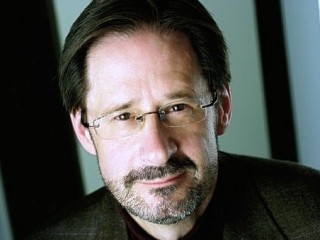
Steven Stucky biography
Date of birth : 1949-11-07
Date of death : -
Birthplace : Hutchinson, Kansas,U.S.
Nationality : American
Category : Arts and Entertainment
Last modified : 2012-02-15
Credited as : Composer, Pulitzer Prize-winning, conductor
0 votes so far
In 2005 Steven Stucky won a Pulitzer Prize for his "Second Concerto for Orchestra," and the prize was presented at Columbia University in New York City. His longtime friend and colleague, Esa-Pekka Salonen, the music director of the Los Angeles Philharmonic, noted on the Gramophone website that "Steven has managed to combine directness of expression with a very developed sense of music form and gesture like almost no one else today."
Steven Stucky was born on November 7, 1949, in Hutchinson, Kansas, and spent his childhood in Kansas and Texas. He studied at Baylor University in Texas and Cornell University in New York with notable composers such as Richard Willis, Robert Palmer, Karel Husa, and Burrill Philips. In 1974 he won the American Society of Composers, Authors, and Publishers (ASCAP) Victor Herbert Prize, and then won first prize from the American Society of University Composers in 1975. He received a fellowship from the National Endowment for the Arts in 1978, and in 1979 he received fellowships from the American Council of Learned Societies and the National Endowment for the Humanities. From 1978 to 1980 he taught composition at Lawrence University in Appleton, Wisconsin. He moved to New York in 1980, where he became a professor of music at Cornell University, and was later named chairman of Cornell's music department, a position he held until 1997.
Besides writing music, Stucky also writes about music. He won the 1981 ASCAP Deems Taylor Prize for his book Lutoslawski and His Music, about the life of composer and conductor Witold Lutoslawski, who had been Stucky's mentor and friend before his death in 1994. In 1986 Stucky won a Guggenheim Fellowship. In 1988 he was chosen by Los Angeles Philharmonic music director Andre Previn to serve as composer-in-residence, succeeding John Harbison in that position. When his four-year appointment ended, Los Angeles Philharmonic music director Esa-Pekka Salonen appointed Stucky as the group's new advisor.
In 1997 Stucky founded a contemporary music group called Ensemble X, made up primarily of faculty members from Cornell University and Ithaca College, with the goal of performing new classical pieces. That same year he won a Bogliasco Fellowship. In the summer of 2001 he was composer in residence at the Aspen Music Festival and School, and also served as visiting professor of composition at the Eastman School of Music. In 2002 he received the Goddard Lieberson Fellowship of the American Academy of Arts and Letters. He was the Ernest Bloch Professor at the University of California at Berkeley in 2003. Stucky was nominated for a Pulitzer Prize nearly every year for 20 years before winning in 2005 for his work "Second Concerto for Orchestra."
"I was trying to make a piece that they could really sink their teeth into, really show off and really enjoy," Stucky told the Ithaca Journal. He said he was not thinking about awards when he wrote the piece in the fall of 2003, but only wanted to write a satisfying piece. "I hope people will hear it and play it," he said. "The piece they chose is a piece that I like, that I am particularly proud of."
The Pulitzer Prize for music was first awarded in 1943. The music prize has gone to such major works as Aaron Copland's "Appalachian Spring" in 1945, Samuel Barber's "Vanessa," and John Adams's "On the Transportation of Souls" in 2003. In the late 1990s and early 2000s, the Pulitzer board came under a great deal of scrutiny and criticism for focusing primarily on classical music and academic composers. In June of 2004 the board responded by making changes in the criteria for the music prize, hoping to encourage composers of musical theater and jazz to submit their work. The definition of the prize had previously read "For distinguished musical composition of significant dimension by an American that has had its first performance in the United States during the year." The new language dropped the words "of significant dimension," and included the alternative of "recording" in addition to "performance." Prior to the changes, proposed works had to have been performed for the first time in the United States during the year prior to submission. The new rules allowed for the release of a recording in lieu of a performance. They also no longer required a score to be submitted. In addition, the jury was changed from four composers and a critic to three composers, a critic, and a person from elsewhere in the music world. The prize includes an award of $10,000.
The jury comprised conductor David Zinman, who had conducted the premieres of several of Stucky's works; composer Gunther Schuller; jazz pianist and composer Muhal Richard Abrams; composer Christopher Rouse; and Los Angeles Times critic Mark Swed. Other finalists for the 2005 prize included Elliot Carter's "Dialogues" and "You Are (Variations)," by Steve Reich.
Stucky and his wife and two children live in Ithaca, New York. In addition to the Second Concerto for Orchestra, his recent works have included the percussion concerto Spirit Voices, premiered by the National Symphony; and To Whom I Said Farewell, a song cycle for mezzo-soprano and chamber orchestra premiered by the Los Angeles Philharmonic New Music Group. Among his frequently-heard compositions are the chamber works Sappho Fragments (1982) and Boston Fancies (1985), and the orchestral works Dreamwaltzes (1986), Concerto for Orchestra (1987), and Son et Lumiere (1988). He continues to be an active teacher, writer, composer, and conductor.
















